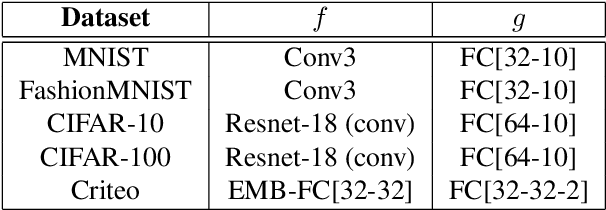Gradient Inversion Attack: Leaking Private Labels in Two-Party Split Learning
Paper and Code
Nov 25, 2021



Split learning is a popular technique used to perform vertical federated learning, where the goal is to jointly train a model on the private input and label data held by two parties. To preserve privacy of the input and label data, this technique uses a split model and only requires the exchange of intermediate representations (IR) of the inputs and gradients of the IR between the two parties during the learning process. In this paper, we propose Gradient Inversion Attack (GIA), a label leakage attack that allows an adversarial input owner to learn the label owner's private labels by exploiting the gradient information obtained during split learning. GIA frames the label leakage attack as a supervised learning problem by developing a novel loss function using certain key properties of the dataset and models. Our attack can uncover the private label data on several multi-class image classification problems and a binary conversion prediction task with near-perfect accuracy (97.01% - 99.96%), demonstrating that split learning provides negligible privacy benefits to the label owner. Furthermore, we evaluate the use of gradient noise to defend against GIA. While this technique is effective for simpler datasets, it significantly degrades utility for datasets with higher input dimensionality. Our findings underscore the need for better privacy-preserving training techniques for vertically split data.
 Add to Chrome
Add to Chrome Add to Firefox
Add to Firefox Add to Edge
Add to Edge